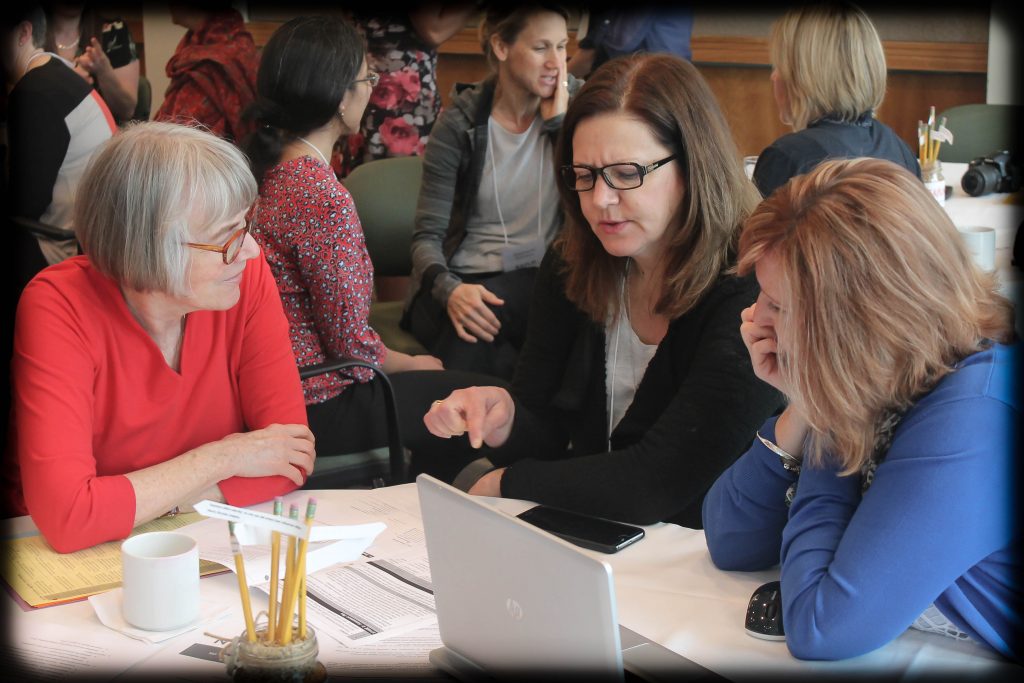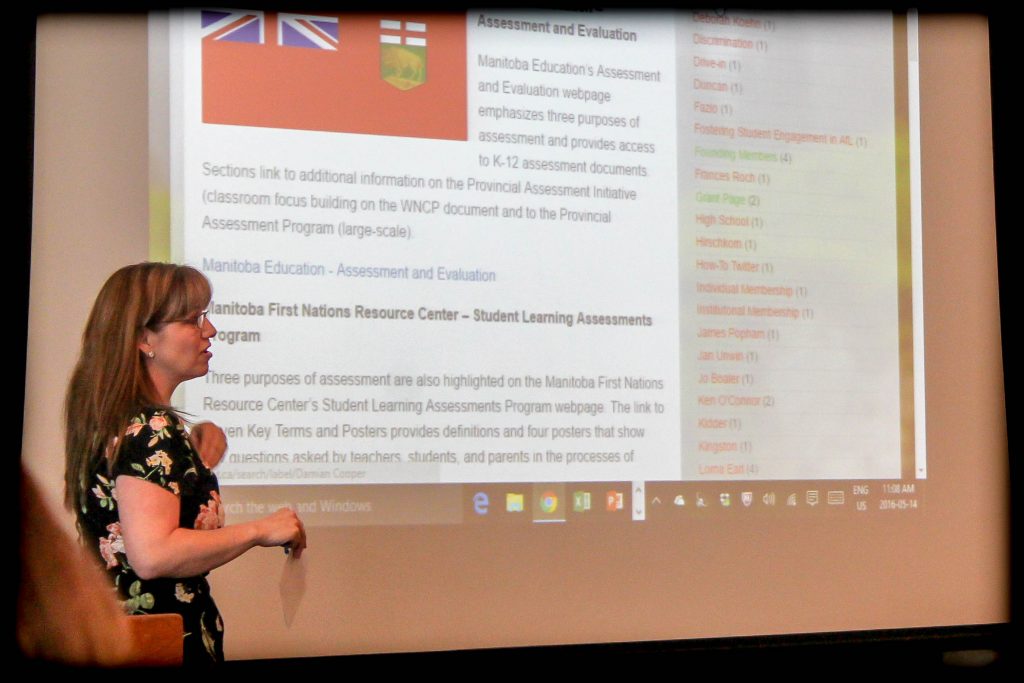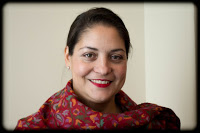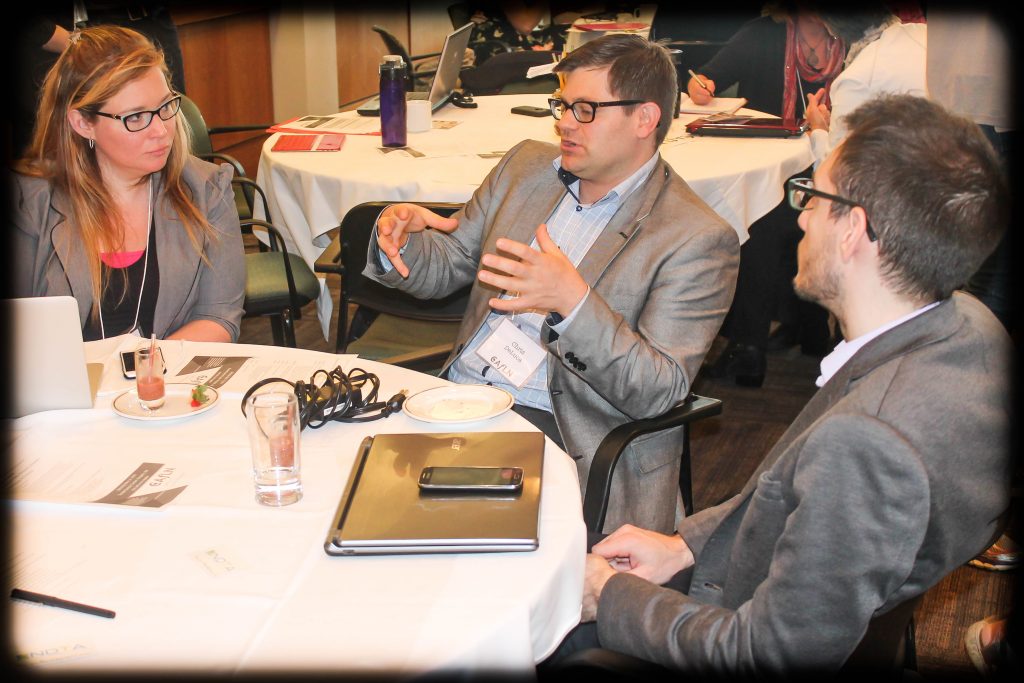The third CAfLN Symposium was held at the Donald Gordon Conference Centre on Saturday April 14th. After a delicious breakfast buffet, Chris DeLuca introduced Dr. Don Klinger, Associate Dean of Graduate Studies and Research, Faculty of Education and Liying Cheng, Director of the Assessment and Evaluation Group, Faculty of Education who brought greetings from Queen’s and welcomed the 40 CAfLN members representing six provinces and all levels of education in Canada. Our president, Damian Cooper welcomed the members and invited Denine Laberge, Secretary of CAfLN and a middle-years teacher from Manitoba, to share her story of how, since her initial involvement with CAfLN at the first conference held in Winnipeg in May 2014, the network has influenced both her professional and personal life.

The first activity was an Artifact Icebreaker where each participant shared physical evidence of their own learning related to Assessment for Learning in the past year. Engaging conversation ensued as members shared and celebrated their learning with each other.
Catching Up with CAfLN
Several members provided updates and information on a number of aspects of CAfLN and CAfLN related activities. Veronica Saretsky, co-chair of the Symposium, showed a video she produced telling CAfLN’s story from its beginning in 2013.

Grant Page, membership chair, demonstrated some of the improvements that have been made to our website while Denine Laberge introduced the blog that has been developed as a complement to the website.
Ken O’Connor provided information about the Twitter chats that were started earlier in the year. Ken has moderated five chats, occurring on the second Tuesday of the month at 8 PM ET using #caflnchat. In each chat there has been lively discussion with participation ranging from 8 to 25 people. The last chat for this school year will take place on June 14, 2016, again at 8 PM ET.
 For the first time at a Symposium, regional representatives shared their story of network development since the previous year’s Conference and Symposium. Justin Green, Joanna Atkinson-Cornthwaite, Marcie Boudreau and Brittany Leonard presented the work being done in Nanaimo Ladysmith Public Schools as it relates to AfL and the new curriculum in BC, demonstrating how networking has been the key in gaining momentum and moving forward with AfL in their schools. CAfLN pop-up meetings combined with the NOII’s (Network of Innovation and Inquiry) Drive-Ins have provided the face-to-face opportunities to collaborate and to share learning and inquiries. Educators in Nanaimo District Schools are also using a blog, a website and multiple district training sessions to promote collaboration. Further teachers in Nanaimo are now paid for one hour per week to support PLC’s and the Collaborative Inquiry process. Assessment for Learning is central to the Collaborative Inquiry process.
For the first time at a Symposium, regional representatives shared their story of network development since the previous year’s Conference and Symposium. Justin Green, Joanna Atkinson-Cornthwaite, Marcie Boudreau and Brittany Leonard presented the work being done in Nanaimo Ladysmith Public Schools as it relates to AfL and the new curriculum in BC, demonstrating how networking has been the key in gaining momentum and moving forward with AfL in their schools. CAfLN pop-up meetings combined with the NOII’s (Network of Innovation and Inquiry) Drive-Ins have provided the face-to-face opportunities to collaborate and to share learning and inquiries. Educators in Nanaimo District Schools are also using a blog, a website and multiple district training sessions to promote collaboration. Further teachers in Nanaimo are now paid for one hour per week to support PLC’s and the Collaborative Inquiry process. Assessment for Learning is central to the Collaborative Inquiry process.
With this year’s Conference and Symposium being in Kingston, it was important to get a sense of what is being done in Ontario. Kristen Clarke, Assessment Coordinator for Peel District School Board described the People, Places and Products that Move AfL Forward in Peel DSB, the second largest school district in Canada. Kristen used the opportunity to demonstrate Storified Tweets from her work in the district and to encourage CAfLN members, via a padlet, to reflect on the needed people, processes and products necessary to move AfL forward in a larger system.
 Members had an opportunity to continue discussions during lunch, served in the Donald Gordon dining room, prior to the Annual General Meeting. During the meeting, the CAflN board for 2016-2017 was established with regional representatives volunteering their time from all six provinces represented at the Symposium.
Members had an opportunity to continue discussions during lunch, served in the Donald Gordon dining room, prior to the Annual General Meeting. During the meeting, the CAflN board for 2016-2017 was established with regional representatives volunteering their time from all six provinces represented at the Symposium.
A series of guided discussions in small groups followed the AGM with the following topics:
- Quality Feedback
- Setting Criteria and Triangulating Evidence
- Go to PD supports for Professional Development Sessions
- Using Technology and Digital Media to Support AfL
- Sharing Successes and Problems of Practice

Members can access discussions on each of the topics above in the Members’ Discussions.
The day wrapped up with a Consensogram Activity in which members identified the percentage to which eight characteristics of AfL are present in their schools and classrooms.
Special thanks to Veronica Saretsky and Lori Jeschke for their leadership in planning a great day of collaboration as we all continue moving forward with Assessment for Learning.
2016 Conference
2016 Annual Conference and Members’ Symposium
>> Symposium Highlights
